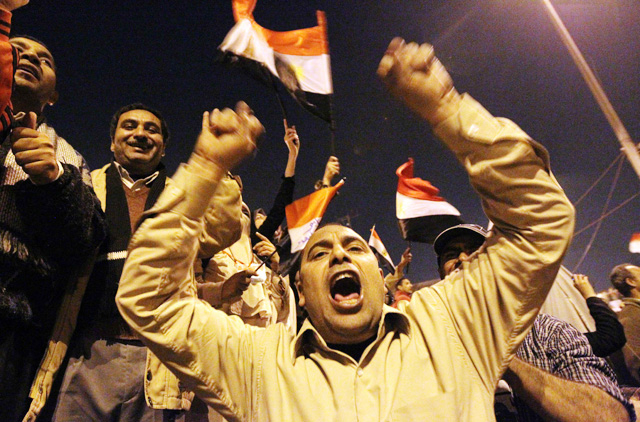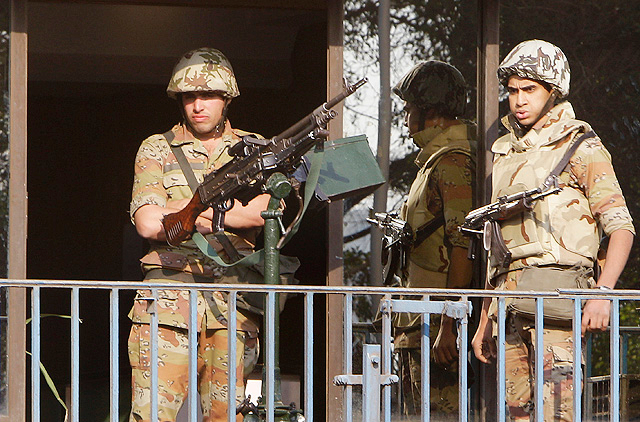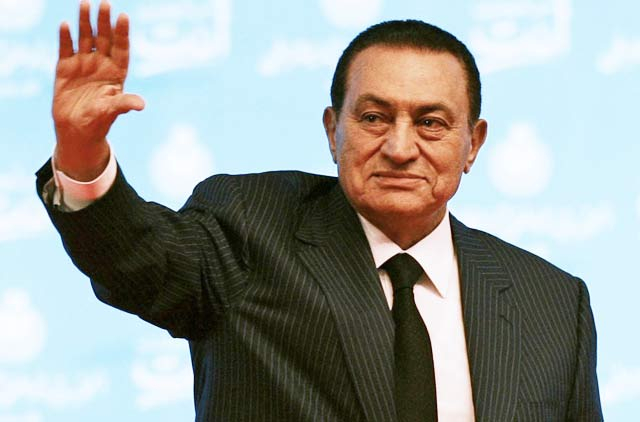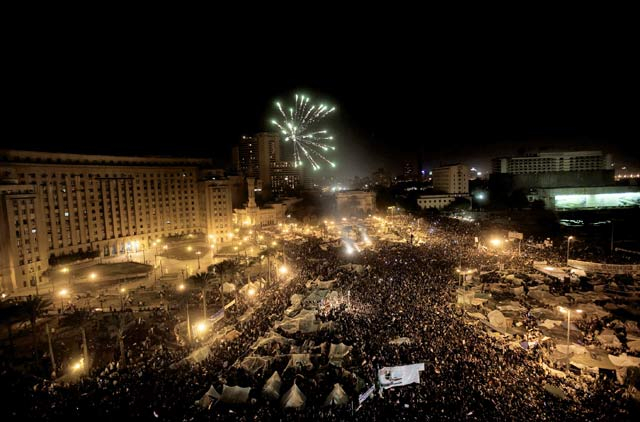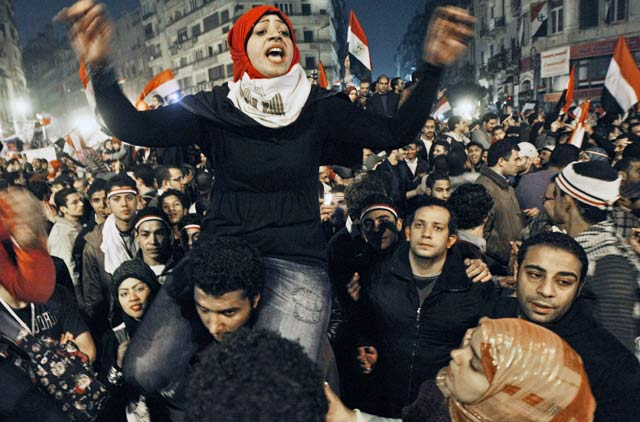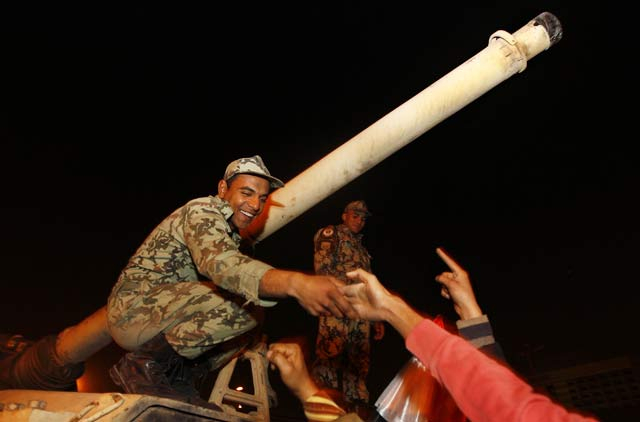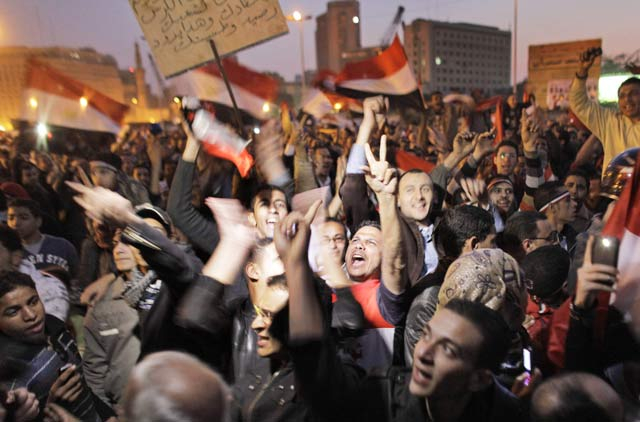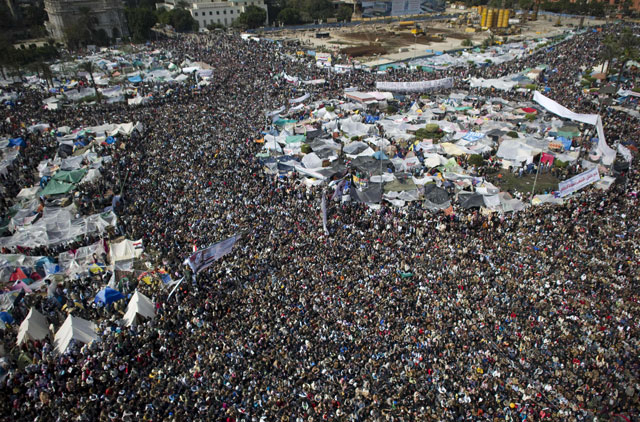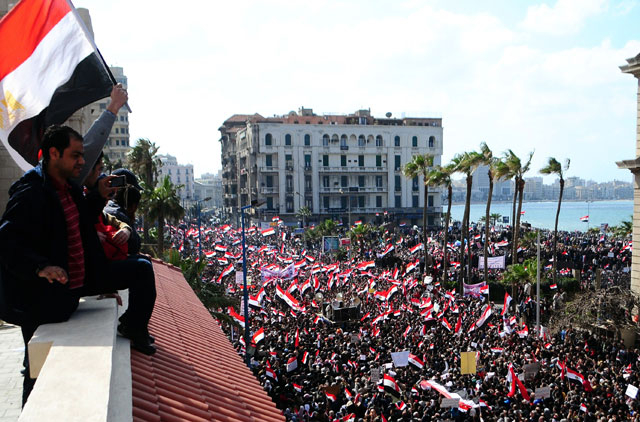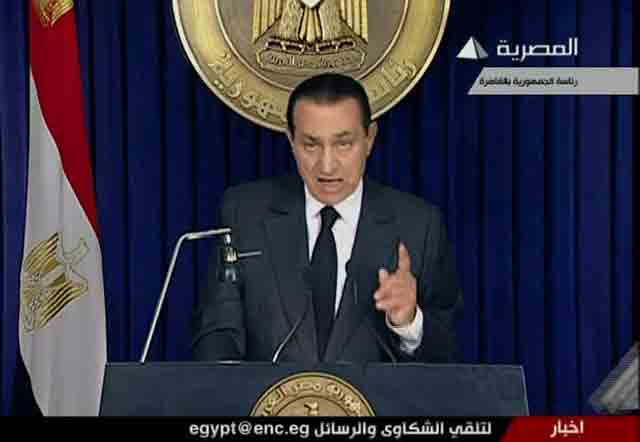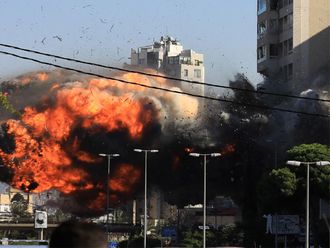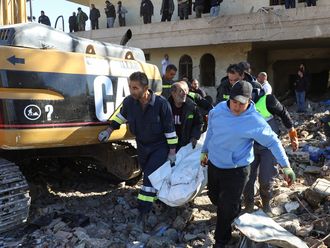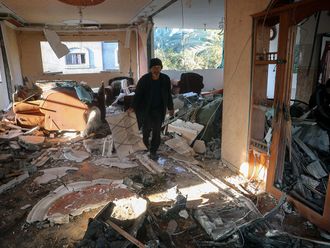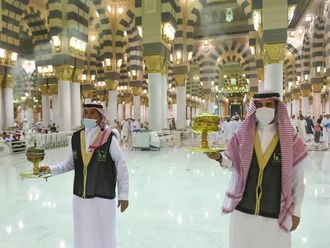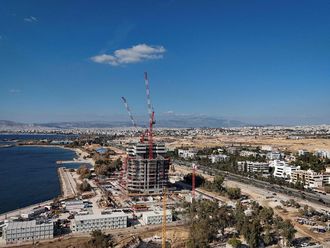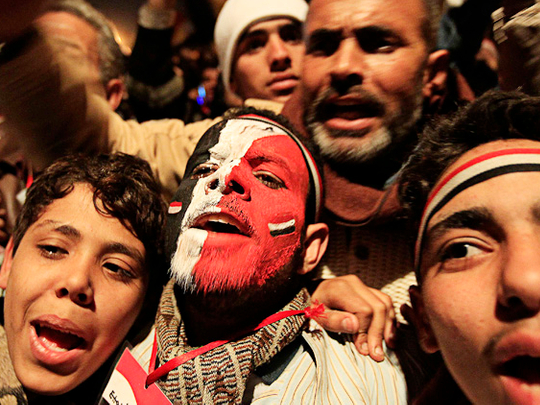
Cairo: Egypt will remain committed to all its regional and international treaties, its ruling military council said on Saturday, implicitly confirming the nation's peace deal with Israel would remain intact.
"The Arab republic of Egypt will remain committed to all its regional and international treaties," the Supreme Council for the Armed Forces said in a televised address.
The announcement was part of "Communique Number 4," issued a day after president Hosni Mubarak handed power to the military.
"The current government and governors undertake to manage affairs until the formation of a new government," a senior army officer said in the statement delivered on state television.
Egypt's treaties include a 1979 peace accord with US ally Israel, which has been watching developments in Egypt with concern.
The army also said Egypt's government will remain in place temporarily. It said it would oversee a peaceful transition towards an elected civilian government.
Protesters form council to defend revolution
Meanwhile, some organisers of the protests that toppled Egypt's Hosni Mubarak said on Saturday they were forming a council to defend the revolution and negotiate with a military council now running the country.
"The purpose of the Council of Trustees is to hold dialogue with the Higher Military Council and to carry the revolution forward through the transitional phase," Khaled Abdel Qader Ouda, an academic, told reporters in Cairo's Tahrir Square.
"The council will have the authority to call for protests or call them off depending on how the situation develops," he said. Ouda said the Council of Trustees would call for a mass turnout next Friday to celebrate the success of the revolution.
The council would have about 20 members, including protest organisers, prominent individuals and leaders from across the political spectrum, he said.
Contacts were still under way to check whether some prospective members were ready to join.
Egypt slaps travel ban on ex-PM: state media
Egypt's chief prosecutor on Saturday banned former prime minister Ahmad Nazif from leaving the country, a day after the overthrow of president Hosni Mubarak, state news agency Mena reported.
The prosecutor also banned Habib Al Adly, the widely despised former interior minister, from travelling and froze his assets, Mena said.
The two ministers were sacked along with the rest of the government in a failed bid by Mubarak to placate protesters in the early days of the uprising that led to his resignation on Friday, ending his 30-year reign.
Information Minister Anas Al Fiqi under house arrest
Al Arabiya, quoting army sources, reported that Egyptian Information Minister Anas Al Fiqi has been placed under house arrest.
Al Fiqi was said to be among the ministers banned from travelling outside the country without permission from the authorities and the army
Earlier on Saturday, Al Arabiya television reported that the Egyptian army would soon dismiss the cabinet and suspend parliament.
The army dismantled checkpoints on Saturday around Al Tahrir, or Liberation, Square, which became the epicentre of the protest movement, and some makeshift barricades were being removed.
The head of the Constitutional Court would join the leadership with the military council, which was given the job of running the country of 80 million people.
Potential leaders
After Egyptian President Hosni Mubarak's exit on Friday, there was no obvious person leading Egypt's revolution.
Among possible leaders was Ayman Nour, who challenged Mubarak in the most recent presidential election and was later charged with forgery and jailed for three years.
Arab League Secretary-General Amr Mousa, a former Egyptian foreign minister, has often won Arab public support for his outspoken comments. Mousa said on Friday he would leave the pan-Arab body which he headed for about 10 years within weeks.
There were also some popular members from the Muslim Brotherhood group and other Opposition parties.
It was still unclear if any of the anonymous youth leaders behind the well-organised revolt wanted or would be allowed to hold office.
Another candidate was Mohammad Al Baradei, a veteran diplomat, Nobel Peace Prize laureate and leading Opposition activist, who started a campaign last year asking for democracy and an end to the current regime. Asked on Friday if he was going to run for presidency, he said the issue was not on his mind.
Egypt looks forward
Millions of Egyptians on Saturday celebrated the fall of the man who ruled for 30 years; hoping their army will grant them democracy now that Mubarak is gone.
A wave of people power has roared across the biggest Arab nation, just four weeks after Tunisians toppled their own president.
"I am proud to be Egyptian, that's the only way I can say it," said Rasha Abu Omar, a call centre worker, among the throngs on Cairo's Al Tahrir, or Liberation, Square.
Hours after word flashed out on Friday that Mubarak was stepping down and handing over to the army, it seemed, every street and neighbourhood across the country was packed full.
Through the night, fireworks cracked, cars honked under swathes of red, white and black Egyptian flags, people hoisted their children above their heads. Some took souvenir snaps with smiling soldiers on their tanks on city streets.
"We are finally going to get a government we choose," the 29-year-old Abu Omar added. "Perhaps we will finally get to have the better country we always dreamed of."
Explosion of joy
Mubarak stepped down on Friday after three-decades of autocratic rule and handed power to a junta of senior military commanders, triggering an explosion of joy on the streets.
Across Cairo, the chant went up: "We the people have overthrown the regime!"
A grim-faced and ashen Vice President Omar Sulaiman announced the handover on state television after an extraordinary national outpouring of rage brought more than a million furious demonstrators onto the streets.
"President Mohammed Hosni Mubarak has decided to leave the post of president of the republic and has tasked the Supreme Council of the Armed Forces to manage the state's affairs," Sulaiman said.
The statement appeared to bring an end to constitutional rule in Egypt and invest power in a group of generals representing a military that has long been the power behind the throne in the Arab world's most populous country.
The Supreme Council of the Armed Forces later issued a statement saying that the council is not a substitute for the demands of the people. Instead it will function as a facilitator to bring about all the changes that the protestors have been damanding for.
It also said that it appreciated what president Hosni Mubarak has contributed to Egypt both in the times of peace and war.
In addition, the council saluted all the martyrs who had died during the uprising.
Earlier, the 82-year-old strongman had flown out of Cairo to his holiday retreat at Sharm Al Sheikh on the Red Sea, his ruling party said.
As news spread, cries of "Allahu Akbar" - God is greatest! - and howls of victory rang out in the streets of the capital, firecrackers exploded, dancing broke out and women ululated their joy.
In Tahrir Square several protesters fainted with the emotion of the moment following two weeks of protest.
The plaza has become a focal point of the revolt since it was occupied by protesters in late January, and earlier in the day had been thronged by hundreds of thousands of Egyptians, who prayed and chanted abuse at Mubarak.
Nevertheless, there was not unbridled joy at his departure. Many remained concerned that Egypt still has a long way to go to shake off its six decade record of repression and autocracy. Outside Mubarak's fortified presidential compound, Lubna Darwish wept.
"I'm crying because I'm happy," the 24-year-old said. "I'm happy, but we have much more to do. The people need to control this. We love the army, but the people made this revolution and they should control it."
Mohammed Gouda, an 18-year-old student, echoed her concern.
"We don't want another 1952. That was a coup, not a revolution. Has Mubarak resigned or has the army taken over? The youth should remain alert," he said, referring to Egypt's last military takeover.
"He has to leave the country, our demands are clear, we want the entire NDP to be dissolved and to get out because they have destroyed the country," said Magdi Sabri, a middle-aged man protesting outside state television.
Before the announcement, in a show of popular solidarity in at least the blower levels of the army, at least three Egyptian officers had shed their weapons and uniforms and joined the protesters.
An impassioned preacher addressed the military in his sermon, exhorting them to "act in a way that will be acceptable to God on judgement day," shortly before fainting and being carried away through the crowd.
On Thursday night, hundreds of thousands had crowded into Tahrir Square to hear a speech that was widely expected to be Mubarak's last as president.
Instead, he delegated some of his powers to his ally and Egypt's former intelligence supremo, Omar Sulaiman, while vowing he would stay in office until September and one day die in Egypt, ruling out a flight into exile.
News of the resignation had an immediate impact on Wall Street, where Dow Jones Industrial Average moving from an early slight loss to add 0.30 percent, while the Nasdaq index rose 0.30 percent.
Israel - fearful that the uprising might open the door to a hostile Islamist regime in Cairo - said it hoped the transition of power in Egypt will be conducted "smoothly," a government official told AFP.
Tunisians danced in the street and blared their horns in celebration at the toppling of Mubarak, four weeks after their uprising resulted in the downfall of longtime president Zine El Abidine Ben Ali.
In Brussels, EU foreign affairs chief Catherine Ashton said that by standing down Mubarak, had "opened the way to faster and deeper reforms".
Mubarak had also been on a collision course with the international community, and in particular Egypt's key ally and donor, Washington.
In his speech on Thursday, he took a swipe at the United States and other countries that want a faster transition to democracy in the Arab world's most populous nation, vowing: "I have never bent to foreign diktats."
US President Barack Obama reacted with a flash of anger of his own, saying Mubarak had failed to map out "meaningful or sufficient" change, or to speak clearly enough to Egypt and the world.
Mubarak had sought to cling to power, handing some of his authorities to Sulaiman while keeping his title. But an explosion of protests on Friday rejecting the move appeared to have pushed the military into forcing him out completely.
Hundreds of thousands marched throughout the day in cities across the country as soliders stood by, besieging his palace in Cairo and Alexandria and the state TV building. A governor of a southern province was forced to flee to safety in the face of protests there.
Nobel Peace laureate Mohammad Al Baradei, whose young suporters were among the organizers of the protest movement, told The Associated Press, "This is the greatest day of my life."
"The country has been liberated after decades of repression," he said adding that he expects a "beautiful" transition of power.
Leaves for Sharm Al Shaikh
The Egyptian presidency is to make an "urgent and important" statement shortly, state television had said on Friday, after a ruling party spokesman confirmed the president had left Cairo for Sharm Al Shaikh.
Earlier, Al Arabiya television reported that President Hosni Mubarak and his family had left Cairo to an unknown destination from a military airbase in the suburbs. It did not give a source.
Al Arabiya had initially reported "news" that Mubarak and his family had left Egypt.
Embattled Egyptian President 's move to the resort of Sharm Al Shaikh is a 'positive first step,' a US official said on Friday in Washington, on a day of high tension in the Cairo crisis.
On Friday afternoon, demonstrators had thronged Cairo's Tahrir Square , chanting against President Mubarak.
They reacted with fury Friday after the military threw its weight behind President Mubarak's attempt to cling on to power despite massive nationwide protests.
In pictures: Chaos reigns in Egypt
At the same time as a statement was read out on state television, an army colonel read out the same message - in which the military high command endorsed Mubarak's reform plans - in front of Mubarak's palace in Cairo.
Protesters gathered outside the palace, many of whom had hoped the military would intervene to chase the 82-year-old strongman from office, erupted angrily and one grabbed the officer's microphone to denounce the move.
"You have disappointed us, all our hopes rested in you," he shouted, as the crowd began to chant slogans calling for Mubarak to be put on trial.
"No, no, this is not a coup," the colonel protested, insisting that the army would not take power itself, but would work to ensure that the popular will was reflected in the civilian regime's programme.
In central Cairo's Tahrir Square, the epicentre of the revolt, hundreds of thousands of demonstrators had already begun Friday prayers when the statement was released, and were not already aware of its contents.
The imam leading the prayers fainted towards the end of his sermon, but not before he had called on the army to "act in a way that will be acceptable to God on judgement day."
Egyptians had gathered outside President Hosni Mubarak's palace on Friday to call for his removal from power, the army did not try to stop them and one demonstrator said they planned to take over the building.
"Down, down Hosni Mubarak," chanted the protesters, who numbered a few dozen.
Protesters had walked to the presidential palace in the Heliopolis suburb of Cairo on Thursday after Mubarak said he had handed presidential powers to his deputy, Vice-President Omar Sulaiman, among other steps that did not meet their demands.
"We will march to the palace and oust Mubarak, and we know the world is on our side," said Nurhaan Ismail, a protester, 34.
Meanwhile, the state news agency reported that Egyptian military leaders have held an "important" meeting and plan to issue a response, as protesters enraged by President Hosni Mubarak's latest refusal to step down, mass for new demonstrations.
Mena says the chief commander and defense minister, Field Marshal Hussain Tantawi, chaired a meeting Friday of the Armed Forces Supreme Council and the military will issue important statement to the people afterward.
Mubarak squashes speculations
Mubarak gave most of his powers to his vice president but refused to resign or leave the country late Thursday, causing widespread anger and promises for a new push against him.
Hardly had Mubarak finished his televised address Thursday night when thousands of protesters, congregating in Al Tharir Square for 17days, chanted in unison: "We will not leave until he leaves."
In the 17-minute address, his third since the eruption of unprecedented massive protests against his 30-year rule, Mubarak transferred his powers to Vice President Omar Suliman and ordered the amendment of five constitutional articles.
"This man has lost the ability to listen to his people. He insists on clinging to power despite the repeated demand for him to step down immediately," said Mahmoud Khedr, 22, who has been camping out in Al Tharir Square for 15 days.
"Mubarak is still manuvering. His claim of transferring power to vice president is yet another ploy on his part. He can regain these powers whenever he wants," he added.
In his address, Mubarak reiterated his resolve to stay on until his term ends next September, saying he wants to ensure "a smooth and peaceful transfer of power". He also vowed to tough punish those involved in killing protesters.
"If there is anybody to be punished for those killings, he must be Mubarak himself," said Shawki Al Sayed.
"Mubarak is the supreme commander of the police, who ordered killing those protesters", he added, as other angry protesters chanted: "We all go to the (presidential) palace in the afternoon."
Groups of the protesters have said they will march on to the presidential palace in Heliopolis in eastern Cairo as part of what they call the Friday of Defiance.
With inputs from agencies


